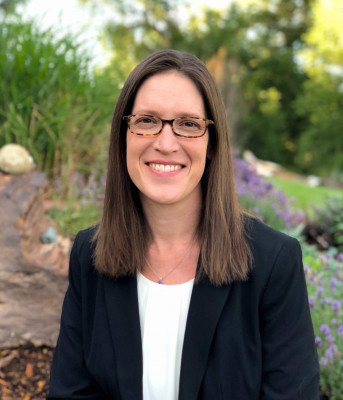Undergraduate Degree
The Bachelor of Music, Music Therapy Concentration is a professional degree designed to prepare students to take the examination of the Certification Board for Music Therapists (MT-BC). Music therapy is the clinical and evidence-based use of music to accomplish individualized goals within a therapeutic relationship. As a MT-BC, graduates may work in a variety of health care settings, including hospitals, clinics, rehabilitation facilities, assisted living centers, and in special education. Some music therapists maintain private practices or serve as consultants.
The undergraduate curriculum includes core music courses, music therapy methods and research courses, and general education courses. All students learn to demonstrate musicianship on several instruments including piano, guitar, and voice. Students engage with community members in a variety of service learning and clinical practicum placements, where they are supervised by board-certified music therapists. Students also complete a clinical internship at one of several approved sites, for a total of 1200 hours of clinical experience (as required by the American Music Therapy Association).
The Music Therapy program at CSU is internationally recognized for its leadership in clinical training and research. The music therapy area includes the Undergraduate Music Therapy Research Academy and the interdisciplinary Brainwaves Research Laboratory, where students have opportunities for hands-on involvement in music and music therapy research.
A background check is required prior to participating in the practicum course (MU 486A).
Program-level Learning Objectives
- Demonstrate foundational implementation of the four music therapy methods: improvisation, composition, recreative, and receptive.
- Identify a variety of diagnostic criteria for primary special needs populations, foremost including autism spectrum disorder, intellectual/developmental disabilities, Alzheimer’s disease, stroke, Parkinson’s Disease, mood disorders, thought disorders, and chemical dependency.
- Describe fundamental neuroscience as it relates to how the brain processes music, typically and atypically.
- Use evidence-based practice concepts and ideas in terms of knowing how to access the literature base, understand the client experience, and know the limits of one’s personal and clinical expertise.
Aspirations for Student Achievement
Upon completion of this program, students are expected to exhibit American Music Therapy Association professional competencies. Students who earn a B.M. in Music Therapy from CSU demonstrate learning in music, neuroscience of music therapy, music therapy clinical practice, and music therapy research.
Music Therapy Undergraduate Research Academy
CSU is a leader in music therapy research, with faculty and students conducting research on the impact of music therapy in different populations. The CSU Music Therapy Research Academy provides opportunities for undergraduate students to become involved in interdisciplinary research focused on the impact of music on human functioning along the lifespan. The research academy has various projects active throughout the year, including projects focused on the understanding music perception and production, rhythmic motor synchronization, and music therapy for persons with different abilities.
Undergraduate Music Therapy Audition/Interview Process
Students applying for the B.M. in Music Therapy must interview and audition with Music Therapy faculty members.
Prospective music therapy students can also audition to be part of an applied studio (i.e., flute, violin, voice), in addition to the music therapy area. Acceptance into an applied studio is necessary if a student will engage in lessons on their primary instrument for their elective credits. Studio membership is not required for entry to the music therapy program and students may elect to enter on a “no studio” track.
Please note that CSU Music scholarships are primarily funded through applied instrument/voice studios and students seeking larger scholarship awards must audition for an applied studio (and continue playing in the studio/ensembles to maintain their scholarship).
More Information About Studio/No Studio Options
Audition Required of All Music Therapy Applicants
All prospective music therapy students will be asked to complete the following audition and interview process for the music therapy program. Students who wish to take lessons in an applied studio (i.e., flute, voice) also need to audition for that studio (see studio audition information here). However, studio membership is not required for entry to the music therapy program and students may elect to enter on a “no studio” track.
The music therapy portion of the audition process consists of a 20-minute interview and audition. You will sign up for this time in Acceptd. During this audition/interview you will be asked to:
- Sing three prepared songs from different genres (i.e., one children’s song, one popular music song, and one country song). You are encouraged to accompany yourself (i.e., guitar, piano, etc.…) while singing these songs; however, you may sing a cappella or use a recorded accompaniment if you have no prior accompaniment instrument experience.
- Sightread rhythms and play by ear/match pitch.
- Interview with the faculty regarding your understanding of music therapy, why you have selected the music therapy major, and what you will contribute to the program.
WATCH A VIDEO ABOUT THE MUSIC THERAPY AUDITION SONG SELECTION
Decisions following the music therapy audition process:
- Accepted to a studio and the music therapy major: Students would take lessons in the applied studio for at least one academic year as a part of their music therapy coursework.
- Accepted to a studio and not the music therapy major: Students could pursue another degree program (Such as the Bachelor of Arts) and study within the applied studio. Students may reapply for the music therapy program for next academic year.
- Accepted to major, not accepted to the applied studio: Students could join the music therapy program; however, would not take lessons in the applied studio in their first year. Students may re-audition for the applied studio in their second year at CSU.
Please also follow the requirements for your instrument/voice and general audition details listed here.


